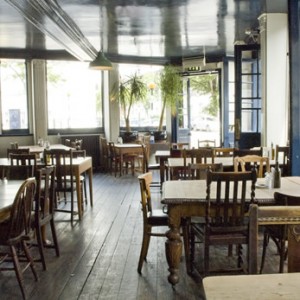How often to customers in pubs and restaurants, when ordering fish, make their choice according to the sustainability of that particular species? How many decide not to ask for fish at all because the menu doesn’t tell them where it came from, and the serving staff can’t advise them either?
The answer to both questions is probably not very many. But that doesn’t mean that customers don’t care. Most people are understandably hazy about the current stock levels for most of the commoner fish on British menus, and, with little or no information available, put it to the back of their minds and order what they like.
It ought not to be like this. We’ve known, for some time, that many fish are in trouble. We don’t need to know the finer details of population numbers when we place our orders. I suspect that people would, however, welcome some basic information, and being told the positives, such as that the fish they serve comes from a sustainable source, and that by eating it they are not contributing to its decline, or even its demise. Why should that be so difficult?
Restaurants and pubs that don’t make a virtue of putting sustainable fish on their menus would argue that the public aren’t really interested. Then again, their lack of interest may be a direct result of this lack of information. For all that those places that do tell you where your fish comes from, and stress that they only buy sustainable fish, are burnishing some rather rare credentials in the pub and restaurant trade. And they deserve it.
The latest accolade has settled at the door of the Duke of Cambridge in Islington – the name alone is a useful selling point for a pub these days. The website www.fish2fork.com has just upgraded it from a 4.0 Blue Fish restaurant to a 4.5 restaurant, putting it on a par with the best in the country.
The restaurant says it has only ever bought sustainable fish. “There really is no excuse for any restaurant to do otherwise.” It never buys endangered species or fish in its breeding season. It works with fishermen in the South and South East coasts, who only use sustainable methods working on day boats. It does serve farmed fish, but that all comes from local Soil Association certified organic fish farms.
Explaining the upgrade, Fish2fork say that since its last review the pub has added a blackboard to give customers more information about the fish on offer; the menu states the area and method of capture of all its fish.
I first came across a restaurant which stated plainly where it’s fish came from in Vancouver in 2009, and even then it wasn’t particularly new. Under the city’s Ocean Wise programme, restaurants pledge to only serve fish from sustainable sources. Coast is one of the best of the Vancouver restaurants in the scheme. They told me on the menu who caught my halibut, and on which boat.
I found it again in Whitby, where the menu said my brill came from either the Good Intent, Abbey Lee, Maggie M, Our Lass II, all belonging to the small Whitby fishing fleet. The owner is down on the quayside every day to see what they’ve caught, sourcing his product from them “wherever possible”.
One way to take the pressure off threatened species is to serve less fashionable fish that that until recently fishman threw back or gave away because they couldn’t find a market for them. On a visit to Wright Brothers’ Soho Oyster House I saw pollock on the “specials” board. I could not remember if this was the fish that is supposed to be the ethical alternative to cod. In this case there was nothing on the menu to explain it. Fortunately the waitress had the answer. She assured us that all the restaurant’s fish and shellfish came from sustainable sources – “everything we serve is sustainable, caught by day boats in England.”
Two years ago I came across another unfashionable fish at a Visit England’s media reception in London. Gurnard. Chefs from a south coast hotel, the Gallivant at Camber, near Rye, were tempting us with delicious, made-on-the-spot seared Rye bay gurnard on brown shrimp potato cake.
They were small portions, miniatures of the dish the chefs served as a main course back at the hotel. Gurnard is a by-catch, normally caught incidentally, then thrown back in, dead, as the fishermen go after the far more lucrative cod or bass.
In the normal course of eating out customers are unlikely to ask specifically for Gurnard or pollock, if it’s not on the menu. When I ask if a fish is sustainably caught, I fear it is generally pointless question because the waiter doesn’t know the answer, and kit is one that isn’t asked very often.
Back at the Duke of Cambridge, they are celebrating another year as a “pioneering green, and values-driven, business since 1998”. and preparing a winter menu that includes both pollock and gurnard, served respectively with “creamy butterbean cassoulet, spinach and pepper” and “roast butternut squash, mushrooms and romansca sauce.”
Let Fish2fork have the last word: “If all restaurants adopted the policies and approach of Geetie Singh, the owner and founder of [this] gastropub, fish stocks would be much healthier.”

